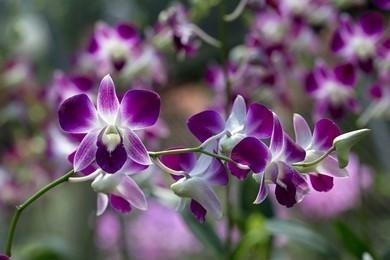Dendrobium Plant Tissue Culture

Dendrobium is the second largest genus in the Orchidaceae family, a perennial herb with about 1400 species worldwide. Many of these species are valuable medicinal herbs, and many have high ornamental value and can be used as potted and cut flowers.
Several species of Dendrobium plants are valuable medicinal herbs, with effects such as clearing heat, benefiting the stomach, moistening the lungs, and relieving cough. Modern pharmacological research also shows that the Dendrobium plant also has the effects of anti-tumor, anti-aging, enhancing human immunity, and blood vessel dilation.
However, for a long time, the source of Dendrobium plant herbs mainly relies on wild resources, and the long period of over-collection has caused a sharp decline in wild resources to meet research and production needs.
Tissue culture service
Dendrobium plants are difficult to reproduce in their natural state, and the seed germination rate is extremely low. The traditional propagation cycle is long and inefficient, and cannot be produced on a large scale. In addition, long-term asexual propagation causes an increasing number of virus-infected plants, which deteriorates the quality of flowers. Therefore, Lifeasible has applied tissue culture technology to Dendrobium plant varieties for fast propagation, rejuvenation, and breeding of good varieties, which is very important in speeding up the breeding process and saving rare and endangered species.
Some of the Dendrobium spp. that we have successfully tissue cultured
- Dendrobium candidum
- Dendrobium loddigessi
- Dendrobium nobile
- Dendrobium densiflorum
- Dendrobium chrysanthum
- Dendrobium fimbriatum
Lifeasible generally obtains regenerated plants of Dendrobium plant tissue culture seedlings through the primary bulb regeneration and organ regeneration routes. The proto-bulb regeneration pathway is divided into proto-bulbogenic and proto-bulb-mimetic types. The organ regeneration pathway is divided into sterile short branching type, bud proliferation type, and adventitious bud.
In addition to the application of traditional tissue culture techniques, Lifeasible is actively refining a new tissue culture technique for the fast multiplication of Dendrobium plants using Thin Cross Section Culture (TCS) technology. This technique is characterized by the ability to provide sufficient nutrients and growth-promoting substances during proliferation, eliminating the interaction of other tissues and organs, and allowing efficient acquisition of regenerated plantlets with a proliferation factor of up to 35.
You want to sign a confidentiality agreement.
You have a specific plant species for your experimental needs.
You have a reliable and relevant cooperation project to discuss.
You are very interested in our project or have any questions.
You need an updated and detailed quotation.
For research or industrial use.



